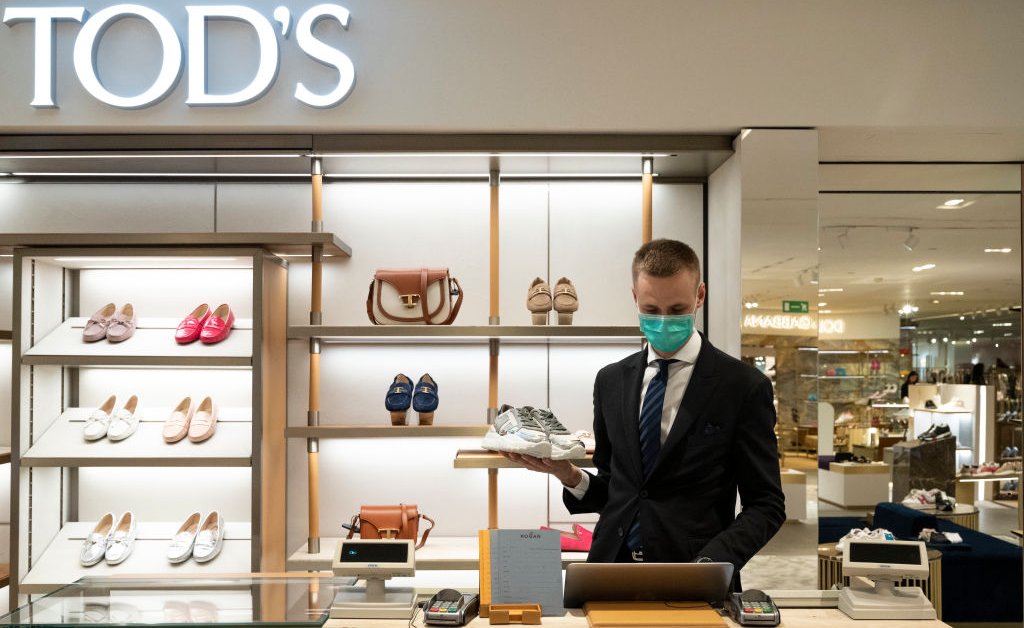
Translating…
After the coronavirus outbreak forced Chinese vogue designers, shoppers and other industry insiders to skip Milan’s Model Week in slack February, the Camera Nazionale della Moda Italiana, or Nationwide Chamber of Italian Model, launched a campaign to repeat team spirit: “China, we are with you.” The slogan turned out to be prophetic. By the quit of vogue week, Italy became dealing with a coronavirus outbreak of its occupy, and Milan’s normally bustling streets had been eerily empty. Fashions postedInstagramselfies in masks,vogue magazinesasked their workers to do business from dwelling, and Giorgio Armani held his girls folk’s Tumble/Iciness 2020/2021 vogue show mask in an empty theater.
The coronavirus outbreak is possible to be a nightmare for Italy’s $100 billion-plus vogue industry, says Carlo Capasa, the pinnacle of the Nationwide Chamber of Italian Model. The nation’s vogue firms had been staring at for a noteworthy commence to 2020, but are now struggling to tackle supply chain issues and aged ask, particularly in China, the coronary heart of the coronavirus outbreak. “For determined, we earn the first six months of 2020 are going to be unhealthy,” Capasa says.
What’s going on to Italy’s vogue industry is possible a preview of the coronavirus’ influence on the worldwide economy more broadly. Firms in a huge number of industries are dependent on China as both a manufacturing behemoth and billion-plus-consumer market. However as existence in some components of the nation involves a shut to-standstill within the face of the outbreak, that reliance looks an increasing number of esteem a weak point.
Worship many other industries, the rage world has lengthy embraced China as a supply of low worth manufacturing — the nation is by a ways the arena’s most intelligent producer of textiles, and it produces loads of the assorted components that shuffle into garments, from buttons to zippers to string. “The overwhelming majority of determined merchandise are only achieved in China,” says Gary A. Wassner, the CEO of Hildun Company and the chairman of Interluxe. “We turned very dependent, and we allowed it to happen because it became worth-atmosphere pleasant, but that’s no longer basically the most intelligent ingredient to desire into consideration.”
That dependency is now proving disastrous. As workers in China are being kept dwelling amid fears of spreading the coronavirus, it’s causing delays within the manufacturing supply chain. These delays are particularly problematic within the rage industry because garments are sold in seasons, experts narrate. Firms that receive uncooked materials esteem textiles slack might occupy to mark down merchandise or worth manufacturers for delays. Wassner provides that firms which sell only “non-public labels,” or one signature stamp, can also very effectively be particularly prone because that is also harder for them to swap suppliers. The construction-centered rapidly vogue industry will additionally be in danger, says Margaret Bishop, an skilled in apparel and textile supply chains. “The timeline from accomplish to produce in rapidly vogue has been very a superb deal compressed, so there’s no longer barely heaps of additional time that if there’s a delay of some kind, you’ve got some margin built in,” she says.
The provision chain issues affecting vogue firms are additionally affecting other industries which would be reliant on Chinese manufacturing, esteem the automotive and technology firms. Pierre Haren, CEO of fintech commence-up Causality Link, says shoppers can also quickly commence to computer screen less kind on retailer cupboards as firms focus their available production on merchandise they already know to be only-sellers, and predicts there’ll possible be supply shortages as early as mid-March.
The style industry and other sectors are additionally dealing with mountainous challenges from the assorted quit of the production chain: consumer ask. Pauline Brown, the dilapidated chairman of North The US at LVMH, says the plush market is already starting up to computer screen a “barely severe” attain because of the virus, particularly as Chinese purchasers quit touring to fetch mountainous-model purchases in cities esteem New York and Paris. Brown says that, as shoppers change into centered on their effectively being, they’re less possible to purchase for luxurious items.
“The Chinese had been basically the most intelligent most intelligent driver in luxurious and vogue within the final 10 years,” says Brown. “They comprise about one-third of all purchases of luxurious, but they are more than 70% of the annual increase in luxurious consumption. So there became a disproportionate reliance for masses of years in that consumer.”
Model firms that had been barely wholesome sooner than the coronavirus outbreak will possible web better from any disruptions, says Brown. However she thinks firms that had been already struggling will acquire it more complicated to jump encourage — and that can possible be glowing of firms in other sectors, too. “Patrons are barely unforgiving,” she says. “As they are saying, when the tide goes out potentialities are you’ll recognize who’s naked, and the tide’s going to no doubt exit.”
Gain The Transient.Register to receive the tip tales it’s good to always grab moral now.

Thanks!
For your security, now we occupy sent a confirmation electronic mail to the address you entered. Click on the hyperlink to substantiate your subscription and begin receiving our newsletters. Ought to you create no longer web the confirmation within 10 minutes, please check your spam folder.
Write toTara Law attara.law@time.com.

